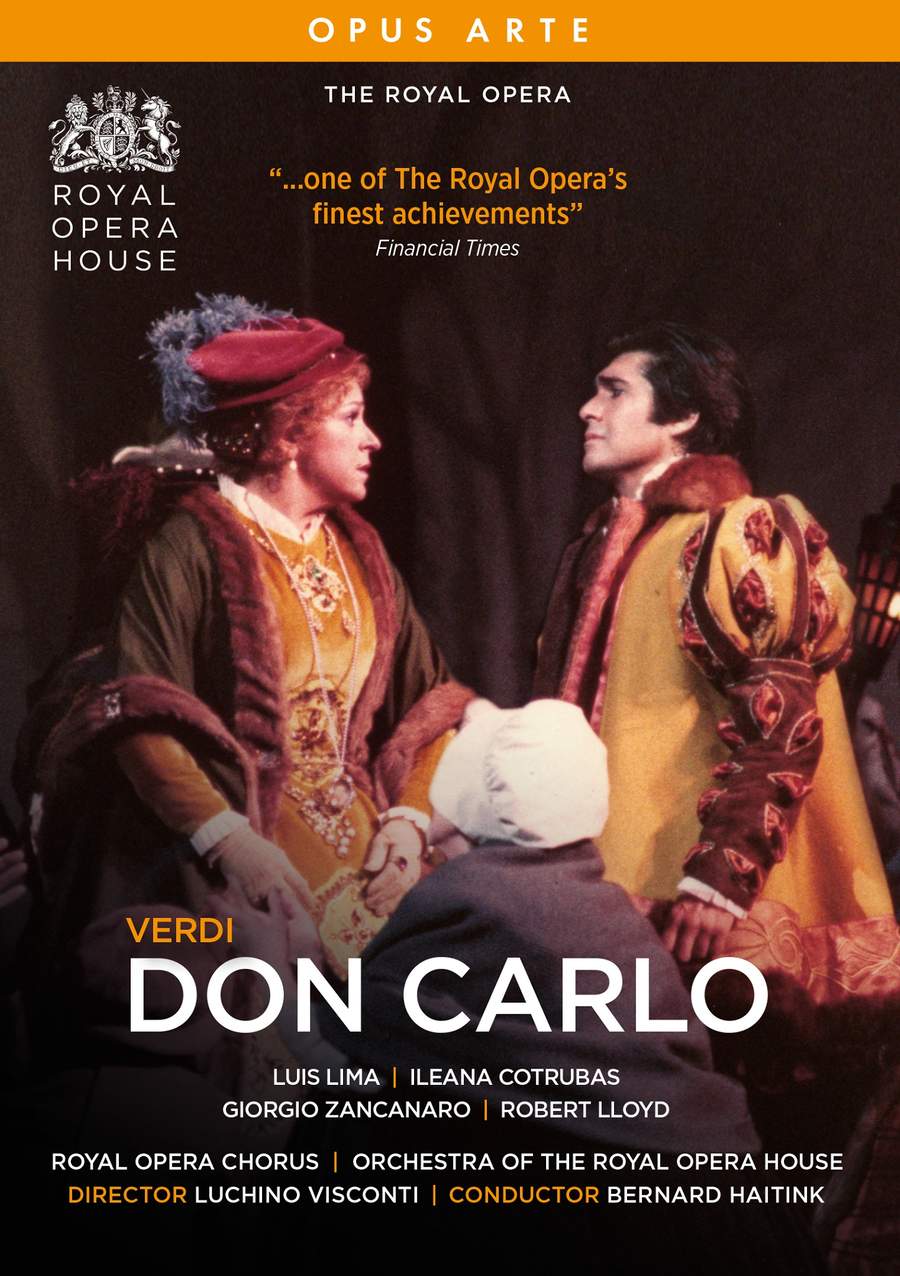VERDI Don Carlo (Haitink)
View record and artist detailsRecord and Artist Details
Genre:
Opera
Label: Opus Arte
Magazine Review Date: 08/2022
Media Format: Digital Versatile Disc
Media Runtime: 204
Mastering:
DDD
Catalogue Number: OA1340D

Tracks:
| Composition | Artist Credit |
|---|---|
| Don Carlo |
Giuseppe Verdi, Composer
Alan Jones, Herald, Tenor Bernard Haitink, Conductor Bruna Baglioni, Eboli, Mezzo soprano Giorgio Zancanaro, Rodrigo, Baritone Ileana Cotrubas, Elisabetta, Soprano John Dobson, Count of Lerma, Tenor Joseph Rouleau, Il Grande Inquisitore, Bass Lola Biagioni, Voice from Heaven, Soprano Luis Lima, Don Carlo, Tenor Matthew Best, Un Frate, Bass Patricia Parker, Tebaldo, Mezzo soprano Robert Lloyd, Filippo II, Bass Royal Opera House Chorus, Covent Garden Royal Opera House Orchestra, Covent Garden |
Author: Neil Fisher
Luchino Visconti’s 1958 production of Verdi’s Don Carlo for Covent Garden was a talismanic event in the Royal Opera’s history. An original cast recording exists but the only full visual souvenir was this 1985 revival conducted by Bernard Haitink.
Now reissued by Opus Arte, if the set is a tribute to Bernard Haitink, who died last year, it’s an oblique one. Nothing is mentioned in the perfunctory booklet, and there are no extras – a few talking heads on the original production (Visconti’s first opera outside Italy) would have been fascinating. If the sound and picture have been sharpened up at all, they both must have been pretty terrible to begin with. The uneven audio balance is particularly distracting, with voices and orchestra poorly blended.
Despite those cavils, it’s an overall rewarding performance of the ‘traditional’ five-act Italian edition. Are Visconti’s wonderful, painterly sets more striking than his gorgeously intricate 16th-century-inspired costumes? It’s a score draw, with bonus marks for the pair of wolfhounds that Robert Lloyd’s Philip II brings on with him just before he humiliates Ileana Cotrubas’s Elisabetta di Valois by banishing her lady-in-waiting.
The 1985 staging itself is credited to Christopher Renshaw and well filmed by Brian Large. There are stiff moments: set pieces such as the Act 3 auto-da-fé lack a real sense of theatre (an unheavenly Voice from Heaven doesn’t help), and Visconti does nothing with the absurd finale – Charles V’s return from the grave! – to improve it as an ending. The pleasure is all in the visuals and the overall authentically Verdian mood they create: the opera’s protagonists are in a gilded cage, caught between duty and personal passion.
Hatink’s conducting is a slow-burn effort, convincing as the opera builds to its climax and matching the staging for overall majesty but also guilty of some foot-dragging. There are exquisite moments in which the orchestral playing really shines, among them the prelude to Philip’s great study scene in Act 4. Here we see Lloyd’s tortured monarch at his most impressive – he hasn’t the velvety, imposing bass of a Christoff or Furlanetto but he looks like an El Greco portrait come to life and sings with probing intelligence.
The thwarted lovers of the piece are well taken by Cotrubas and Luis Lima. The role was one of the most dramatic the Romanian soprano took and the vocal challenge involved gives her Elisabetta a very tangible sense of vulnerability and innocence. The mentally fragile Don Carlo was clearly a role that affected Lima deeply. Despite some woodiness to his tone, he sings and acts the role with blazing commitment as his Carlo unravels. Vocally, Giorgio Zancanaro’s Posa offers what Lima lacks – wonderful phrasing and bel canto style – but there is barely any acting to speak of. Bruna Baglioni’s Eboli lacks vocal dazzle and Joseph Rouleau’s Grand Inquisitor, a small but crucial role, underwhelms.
Discover the world's largest classical music catalogue with Presto Music.

Gramophone Digital Club
- Digital Edition
- Digital Archive
- Reviews Database
- Full website access
From £8.75 / month
Subscribe
Gramophone Full Club
- Print Edition
- Digital Edition
- Digital Archive
- Reviews Database
- Full website access
From £11.00 / month
Subscribe
If you are a library, university or other organisation that would be interested in an institutional subscription to Gramophone please click here for further information.




